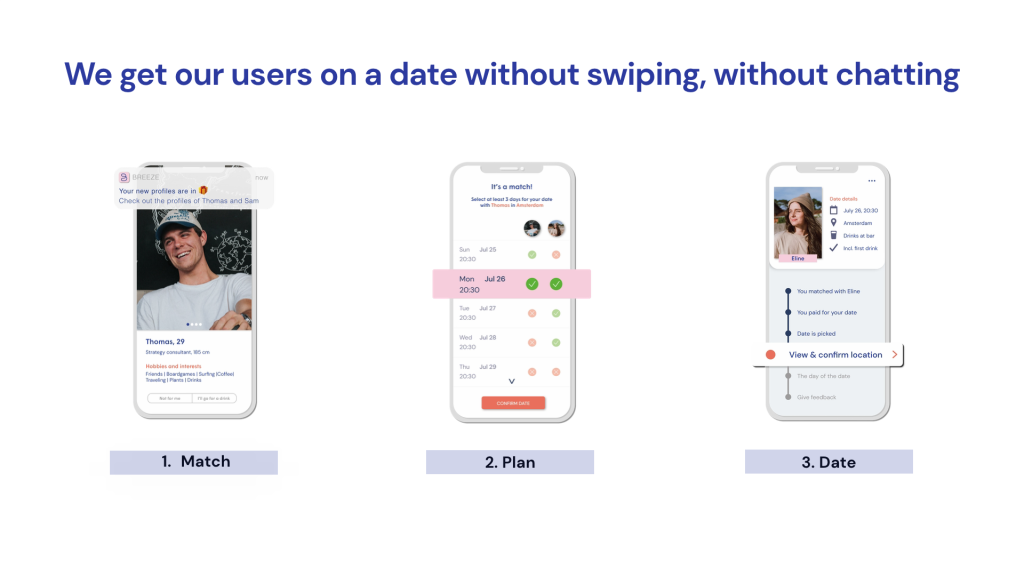The cue for this week’s blog post is as follows: Where in the world is X located, X being a social platform of your own choice I chose Breeze, a Dutch dating app that is well known, but not as super well known as for example Bumble or Tinder. Since the knowledge about its existence is not so widespread, let me quickly introduce you to Breeze.
Breeze started in 2020, as a response to the covid-19 measurements, making it more difficult to date or meet new people in general. The dating app would ‘organize’ a walk between the two people who match on the app so they could stay 1.5 meters apart (remember? It feels so long ago now – at least to me).

Even though COVID is over now, Breeze stayed. That has to do with the multiple features that distinguish Breeze from all the other dating apps out there. Firstly, there is no possibility to chat with the person you swiped right. Personally, and according to what others tell me, this is the most annoying and awkward phase about dating, and Breeze canceled that. Secondly, Breeze offers a selected number of potential matches, so users do not keep on swiping, as if the dating app is some sort of addictive slot machine.
Now you know what Breeze is and have an idea about how it works, I would like to start about the location – the topic this blog is supposed to be mostly about. Breeze is located in Delft, in the midst of the area the app focuses on. Dates that are organized by the app take place in nearby cities, such as The Hague, Amsterdam, Rotterdam, Delft, Utrecht, and Leiden. This leads to the conclusion that the dating app ‘works’ best in the Randstad, the big cities in the west of The Netherlands. This makes the dating app different from most other social platforms that mostly have their headquarters in a big American city, while the app is being used on a global scale.
I think this is why Breeze is this successful: it becomes available in more and more cities, city by city. The app seems to be very dedicated to the places where the app is being used online and the dates find place offline since Breeze has contracts with a few bars in every big western city to host the dates for the matches. Delft itself is one of these big cities, which makes the app more connected to the place it is online and offline being used and sort of ‘down to earth’. This makes the dating app a safer place to use, because of two reasons. First off, when the transition from online to offline takes place, and the matches meet each other, the bars’ staff expects you which can help make you feel more welcome and seen – the bar staff can keep an eye in sight. Secondly, the dating app only makes a profit when the users make a profit from the existence of the app (namely, a date). As a user, you are not ‘used as a product’ by advertising companies, since advertisements do not exist on Breeze.
To me, it feels like Breeze is the most human-orientated dating app out there: made by humans for humans. Of course, there is an algorithm, but not a forever ongoing one. Of course, there is a business model, but only when the users make a profit, too (dates are not for free). I think that this less hurried, more human-focused dating app is what this society needs to experience again: a truer, closer connection.


I must admit I have never heard about Breeze until I read your blog post, but I have to say that I really like the idea behind it! It seems to me that nowadays, dating apps are created in a way that makes the whole process of getting to know someone feel kind of rushed and sloppy (at least that is how I feel sometimes). What I mean by that is that people often match with others just for fun, without having the intention of properly talking to each other, or they cancel the date at the last minute etc. I think that this is partly the case because the Internet puts a certain distance between people, and the whole process becomes kind of impersonal. It seems to me like Breeze indeed has more of a human-oriented approach as you said yourself in your post, and that seems really nice:)